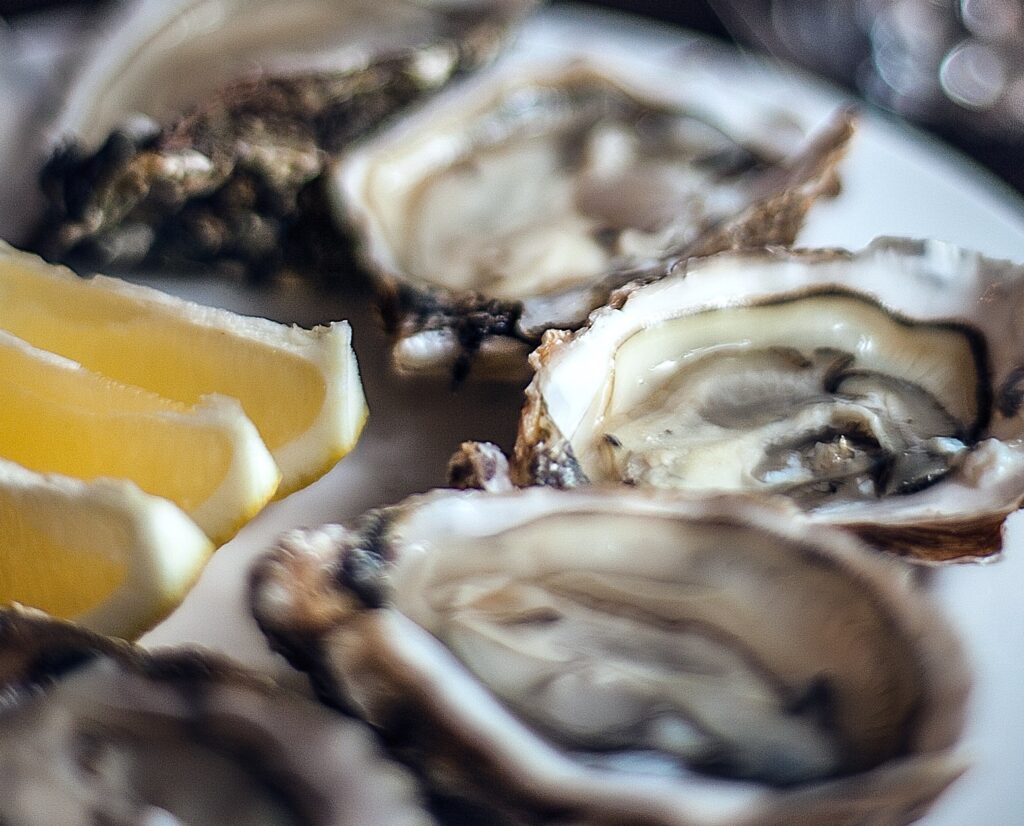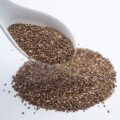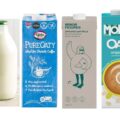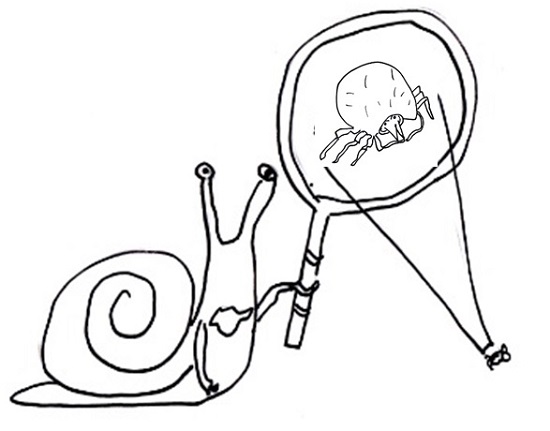If you have a fish or shellfish allergy you’ll be pretty familiar with avoiding fish hidden in sauces, Thai food, flavourings etc. But do you check the labels on vitamins, minerals and supplements?
The issue here is that calcium carbonate could be made from oyster shells which would mean it could contain traces of shellfish. If that’s the case it wouldn’t be suitable for fish or shellfish allergy people or vegans. Since I don’t have a fish or shellfish allergy myself this has never really crossed my mind.
I found an interesting article on The Vegetarian Resource Group Blog called, Calcium Carbonate in most soy, rice beverages and calcium carbonate derived from mineral source not oyster shell.: Source does not have to be labelled.
In this article they list the various potential sources for calcium carbonate as rock, limestone, from the earth and oyster and clam shells.
Regular supporter Lydia shared her and her son’s experience.

A reaction to shellfish in calcium carbonate from oat milk
We aren’t going to mention the brand of oat milk, but Lydia recently contacted a well known oatmilk company which added calcium carbonate to their milk after her son became ill and tests showed shellfish was present. She said he has never eaten them, he hates fish. Lydia feels that, “There was not any mention of shellfish on their products and I have even spoken to vegans that were unaware their calcium supplements contained shellfish. It is even in most antacid tablets and I feel strongly people should be informed. I am at present trying to find a calcium he can take without shellfish and have read taking ‘Tums’ of all things (one antacid without shellfish, bit ironic) which is recommended for calcium intake. ”
Lydia wrote to the company, who she really respects. We won’t mention them here, but she loves that they do an amazing choice of foods for people with allergies as there was a particular egg substitute she wanted to try. She had read the ingredients and noticed there was calcium carbonate. So she emailed them to find out if by some miracle their calcium carbonate is free of shellfish, below is the reply from their Quality Assurance Manager:-
“Please note that the calcium carbonate used in our select products is derived from natural rock formations such as chalk. All our products are free from fish and shellfish. They are also all labelled as vegan, which means they do not contain any animal products or derivatives”
She emailed them back, saying, ‘please note I am no expert or scientist, but feel frustrated that a company selling products for allergy sufferers sent the above reply’. Here’s here email back to the company for clarification:
“Please forgive me if I appear pedantic, but as you know getting correct information is important, because if incorrect, it is potentially life threatening for allergy sufferers. I am aware that chalk is used as a substitute for calcium, however, chalk is derived from a variety of limestone composed mainly from the shells of tiny marine animals known as ‘Foraminifera’. So your products do in fact indirectly contain shellfish derivative! This is dangerous to people with severe allergies to shellfish, not all, as some are allergic to the protein in the flesh of shellfish, but is something important to be acknowledged”.
She feels frustrated and explained to me the following, “I should not have to inform them of basic information they should be aware of if selling to allergy sufferers. I have also written to GlaxoSmithKline who make ‘Tums’ as they state they do not use calcium carbonate made from chalk carbonate. I will be interested to know what they use as I will be informing as many Companies I can to educate them and hopefully get them to change to a safer calcium substitute. People with intolerances and allergies reach for antacids on a regular basis as most contain the calcium carbonate from shellfish not realising they could be exacerbating their conditions. Tablets such as supplements use binders which again contain rubbish for allergy sufferers, the list is endless.
I found another article which stated that Tums antacid tablets, which contain calcium carbonate, does not contain any shellfish. Read Calcium supplements if allergic to shellfish.
If we look at the article linked to at the beginning of this blog it states from the FDA: “If there is someone that has an allergy to shellfish, we would suggest staying away from products or supplements that contain calcium carbonate.”
The problem, explained in the article is that Oysters are not crustaceans. (Shrimp and lobster are.) Oysters (and clams) belong to the class of “shellfish” known as mollusks. For this reason alone, neither oyster protein nor oyster shell would need to be labelled under FALCPA, even though companies may, (and often do), disclose any oyster component in their products voluntarily.
But what if a person is allergic to oysters and clams? It would seem that this is a loop hole that doesn’t require labelling as it’s not technically shellfish, yet our understanding of shellfish would include these also. I would always lump all fish and seafood together, not isolate some as slightly different.
In the UK we have 14 allergens which must be labelled, including fish, shellfish and molluscs.
However in the US, the Big 8 labelled only includes Fish and Crustacean Shellfish. NOT Molluscs. Read Allergy Insight’s blog to see the comparison between the different country labelling laws. Allergens: The Big 8 and The Big 14.
Visit the FDA website for Guidelines on Seafood allergy.
It raises questions for vegans too because they definitely wouldn’t want to consume something made from oyster shells.
If you, like Lydia, are looking for vegan calcium sources you will find this blog, Sources of Calcium for vegans and dairy free really useful.
Oat milks that are freefrom calcium carbonate
You can read my full review of Oat Milk available in the UK with ingredients for each. I will keep adding to this list as there are others that I’ve not yet included in my research. But look out for PureOaty, Plenish and Rude Health Oat milks as these are all really simple and not fortified with added calcium carbonate.
Read more here in Roundup of Oat Milks in the UK
Is there oyster protein left in calcium carbonate?
So my question is, would there be enough protein left in oyster or other fish shells used to make calcium carbonate from chalk?
A quick google threw up this:
Oyster shell is composed of protein polysaccharides and minerals including calcium magnesium, sodium, copper iron, nickel, strontium and some microelements. Chemical and microstructure analysis showed that oyster–shells are predominantly composed of calcium carbonate with rare impurities.
So there definitely is protein in the shells. But how much remains after the shells have been crushed and formed naturally into chalk.
I’m not a scientist of an expert so I wouldn’t know whether this would cause an issue for people with allergies to shellfish. But the anecdotal evidence shared above would suggest that they can and do have enough protein to cause problems.
Visit the Pure Health blog for detailed information on Vegan Supplement Protocol. Micki who writes this blog has researched in detail which supplements should be safe.
I’d love to hear your thoughts. Anyone else had a reaction to calcium carbonate who has a shellfish allergy?
Is this a problem?
Do any vegans out there see this a problem?
Let’s have a heated debate!
Photo by Maria Orlova from Pexels












Well, you learn something every day, don’t you? Even I hadn’t made the connection between chalk and shellfish, to be honest. If I haven’t, MANY people won’t have! Well done Lydia for raising awareness.
In the nutrition field, we would rarely give calcium carbonate as a good source of calcium. It is very unabsorbable and I would always worry people would be then dumping excess calcium in tissues and bone. I used to feel this a lot in massage clients years ago – the muscles have a stiff kind of feeling. I was training as a nutritionist too at the time and realised it was calcium dumping, so all the massage in the world doesn’t help until you change the calcium type and ratio to the agonist mineral magnesium, which relaxes muscles. Also, think bone spurs, gall stones, kidney stones etc etc etc – also calcium excess. Anyway, I am waffling, but it just reminded me. The only time we tend to give carbonate is to bring down a reaction/change the acidity with biocarbonates.
Anyhoo, I would imagine many people are indeed absorbing calcium carbonate as it is ubiquitous in meds, poor quality supplements (of which there are many around still, sadly, and tend to be the most common ones available) and foods. Thank you. Useful reminder. Oh, and thank you for linking to my vegan post – it was Biocare’s protocol, not mine, tho, don’t want to take credit where it’s not due!
I am consciously trying to get natural calcium into my diet as I’d heard the same as you about supplements. We kind of think something being fortified with calcium must be good but not always! I hadn’t realised how damaging they can be though, I just though it wasn’t absorbed. I’m still not sure how much protein might be present in the shells from very old chalk… taken from the ground. it’s definitely a new one on me so more research and testing required! And better labelling if the calcium source is from shells!
I am allergic to shellfish, mollusks, wheat and have other lesser allergies.
I noticed my throat swelling after taking my calcium supplements and identified calcium carbonate as the problem.
When eating gluten-free cereal, I kept coughing as though it had wheat in it and, again, found calcium carbonate was an ingredient.
Calcium carbonate should have its exact source identified so those of us allergic to shellfish and mollusks don’t ingest allergens.
It’s really worrying isn’t it? It really does seem no one is aware of this potential hazard. I must try to get people talking about this more as it needs to be labelled.
Shellfish allergic and my allergist told me to avoid calcium carbonate. I feel sick every time I try cheerios and chex….lactose intolerant and can’t have most non dairy milks.
I am convinced this must be a problem for all shellfish allergic people, but must be a bit like russian roullette as you never know how the calcium carbonate was created. You might find this blog with a Roundup of the Plant Milks avaiable in the UK helpful. I drink Pure Oaty which has no calcium carbonate in it. https://whatallergy.com/2021/06/roundup-of-oat-milks-in-the-uk/
Shellfish allergic, cant use non dairy milk or many cereals….so glad to see I am not alone!
Kim you are not alone! But I’m shocked at how few people realise that the calcium added to plant milks can contain traces. Have you had a reaction to this? I’ve really struggled to find information
I do react and have a difficult time finding plant milks that are safe, along with multi vitamins and cereals. I am officially allergic to oysters, so that is probably why I react, but wish labeling was more clear.
It is really hard isn’t it. I’m not allergic to shellfish, I just choose not have plant milks with that chalky stuff in. I’m currently using Pure Oaty oat milk from Glebe Farms and Jord Swedish Oat Milk. Both are really simple with just oats, water and salt. I love the taste of both in cereals and coffee and you honest can’t tell the difference in baking. Which ones do you buy?
Thank you for this article! Renovera Cooking Wash for produce, which claims to remove waxes, pesticides, and parasites from veggies and fruit. It came highly praised and recommended by this avid long-time vegan family. I was surprised to learn that it was comprised of ark shells! I felt this was hard to find in the listing on amazon what the source was. I know this family stays away from all prior life forms in use not just for ingestion such as won’t drink non-vegan white wine because it could be clarified by shell fish chitin for example as I was told.
Anyways I personally don’t have a problem with the vegan part, although I feel that they should be more forthcoming on the webpage listing and advertising and labeling of the actual bottle which was shown to me in person. I feel so bad that they are essentially eating non-vegan every day with their produce wash since they are so strict with cross contamination even avoiding restaurants that claim to have vegan dishes but don’t trust the cooking, and prep process, that’s how devoted they are.
I do have a major issue and concern since my mom is highly allergic to all shellfish and seafood of any type. She’s had a couple of close calls which drs were sure she wouldn’t survive because of severe anaphylaxis. She is super careful where everything is derived from all medications, ct, scans, or other medical procedures. But I could have easily caused this issue for her and it could have been disastrous. I’m so surprised that this is a warning on the label for this product and that others learned form your article. Thank you for the insight!
Scary isn’t it, I’d never thought of fish traces being in so many things till I wrote this article after a reader messaged me for help and advice and I was so shocked. I am grateful not to have a fish allergy that’s for sure. Keep on being vigilant and keep that precious mum safe. I need to add produce wash products to my list of potential fish contaminants! I wonder if the water filter products also contain shells etc.? more research pending
Shellfish proteins that form limestone are no longer proteins as the process of permineralization that occurs over millions of years replaces the atoms with the predominate elements found in the shells. Moreover, the structure of any organic remains are simply no longer potential allergens as the atoms are no longer comprised of an organic structure suitable to react as an allergen. So, limestone-based calcium products are as shellfish free as anything available and should not be considered organic or containing shellfish.